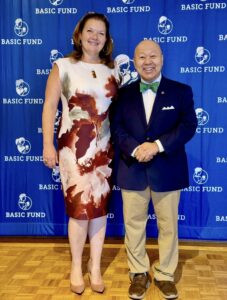According to the organization, “Scholarships are awarded on a sliding scale, covering 25%, 50%, or 75% of the Family Portion of the school’s tuition up to a maximum of $2,750 annually per child.” Thus, parents are asked to fund part of their child’s private school costs to ensure that the family has a stake in their children’s education.
Parents must also agree to participate in their children’s education “through involvement with the school and providing a supportive learning environment.”
Based in Oakland, The BASIC Fund gives families the opportunity to choose from among more than 250 private schools in nine Bay Area counties.

Since its founding, the organization has disbursed or committed more than $200 million in scholarship funds and supported nearly 30,000 students in the Bay Area.
Jim Herbert, the chair of The BASIC Fund, has observed: “It’s such a simple program. Make the money available. Don’t judge where the kids should go—the parents judge. Be open to all types of schools that are doing a good job.”
Indeed, the private schools that partner with The BASIC Fund represent the broad array of non-public education: 45 percent of the Fund’s partners are Catholic schools, 26 percent are independent/non-denominational, 25 percent are non-Catholic Christian, and 4 percent are Jewish, Muslim or other.
Currently, there are nearly 3,000 students receiving a scholarship from the organization. These scholarships are guaranteed to recipients through the eighth grade and, in order to keep families together, siblings are also guaranteed scholarships.
The program has produced highly impressive results, with 98 percent of scholarship recipients graduating from high school (versus a 75 percent graduation rate among Bay Area public high school students).
In addition, 92 percent of scholarship recipients go on the post-secondary education. In contrast, the nationwide rate is just 63 percent—nearly 30 percent less.
Further, scholarship recipients are five times more likely to graduate from a four-year college than their low-income peers nationwide.
While all this data underscores the effectiveness of the program, it is the personal stories of individual children, whose lives were changed by their scholarships, that speak to people’s hearts and tell why school choice is so needed.
I talked with Ana Sanchez, whose BASIC Fund scholarship was greatly responsible for her academic success.
According to Ana, “The BASIC Fund helped my family afford a Catholic education, and I still remember how proud my mother was when she received the scholarship letter — she’s kept it after all these years.”
“Thanks to the BASIC Fund,” she said, “I was able to attend Catholic school in San Francisco.,” which “provided a caring and encouraging environment that supported my growth both academically and socially.”
Eventually, she went on to attend Notre Dame de Namur University, where she earned a bachelor’s degree in psychology and a master’s degree in clinical psychology. But she said she is not stopping: “I am currently pursuing a second master’s in education to become a future school leader.”
Her scholarship and her education transformed her. She said, “Programs like the BASIC Fund have shaped me into a person whose mission is to give back to their community.”
Another BASIC Fund alum, Ella Nguyen, has said, “I am a low-income, first-generation child raised by a single mother.” She is now a student at Stanford University medical school. Ella said her education and success “would not have been easily achievable without [a BASIC Fund scholarship].”
Current scholarship recipients also fully realize how The BASIC Fund program has impacted their lives.
Lyric, who is a seventh grader at Saint Leo the Great Catholic School in Oakland, said: “Because of the BASIC Fund, my family can afford for me to stay at this school, and that has made a huge difference in my life. I have teachers who really know me and push me to do my best, not just in my classes but as a person. I am very grateful that someone believed in my future enough to help with my tuition.”
I talked with Saint Leo the Great principal Sonya Simril who noted that Lyric’s positive experience is typical of BASIC Fund scholarship recipients at her school.
“For decades,” she pointed out, “The BASIC Fund has served as a vital source of educational opportunity for Saint Leo the Great School families.” The scholarships have “enabled students to attend our school who might not otherwise have had the means to do so.” As a result, “This enduring partnership has profoundly impacted the lives of countless families, opening doors to academic growth, spiritual formation, and lifelong success.”
And a better education has led to more successful and fulfilling lives for young people. “Many BASIC Fund recipients,” she observed, “have continued onto higher education and distinguished careers, achievements made possible through this important scholarship program.”
Other school leaders echo Simril’s observations.
At a recent BASIC Fund event, I talked with John Bertolini, president of Kolbe-Trinity School, which is a classical education Catholic school in the Napa Valley. He cited Joshua, a seventh grader who was able to transfer into the school from a public school because of a BASIC Fund scholarship.
He said that Joshua has “thrived academically and spiritually” and has been “challenged and engaged at a higher academic level.”
I also talked with Christopher Mychaluk, the principal at Marin Christian Academy, who told me, “Families are what The BASIC Fund is all about,” and the organization’s “investment in a child’s education transforms not just that child but their entire family legacy.”
Perhaps most of all, parents appreciate the opportunities created by The BASIC Fund.
One low-income mom testified: “I appreciate everything the BASIC Fund has blessed my household with. The private education tuition assistance allowed me, a single mom, to help my children succeed in their lives. None of this would have possible without the scholarships granted to my family.”
Rachel Elginsmith, the CEO of The BASIC Fund, has emphasized, “If we can ensure that students have the proper support and resources during the critical early years, we can set them up for long-term success.”
In a state like California, where achievement rates for students, especially those from low-income families, are at abysmally low levels, expanding successful programs like BASIC Fund scholarships could be the key to closing achievement gaps and ensuring a better future for disadvantaged children.
And, in fact, there is a possibility for California to do exactly that.
Included in President Donald Trump’s One Big Beautiful Bill that he signed earlier this year is a provision that gives up to $1,700 in dollar-for-dollar federal tax credits to individual taxpayers for donations to state-approved, federally recognized non-profits, called scholarship granting organizations (SGOs), that distribute scholarships to eligible children.
The BASIC Fund would be a perfect SGO for this tax credit program. The Fund has noted that the increased donations under the program “could unlock billions of dollars each year, helping students not only with tuition but also with tutoring, books, Advanced Placement exams, and even transportation.”
Discussing the new tax credit, Harvard education professor Martin West observed, “What is clear, is that in any state that wants to do so, the program can be used to support private school choice, and that’s what makes it significant.”
“It really does have the potential,” he said, “to turbocharge the movement to expand private school choice in the United States, which already had a significant momentum at the state level.”
There is one catch, however. For California’s children to experience all these benefits requires Gov. Gavin Newsom to opt the state into the federal tax credit program by January 2027.
While Newsom has opposed efforts to expand school choice in the past, Mike Petrilli of the Fordham Institute has asked: “Will Democratic leaders opt their states into the new federal school choice program, allowing families to accept scholarships that are funded by charitable donations from taxpayers nationwide—scholarships that don’t cost their state a penny, and therefore can’t be said to be taking any money from their public schools?
Already, Democrat North Carolina Gov. Josh Stein has said that he will opt his state into the federal tax credit program. Will Gov. Newsom follow suit, especially if he plans to try and appeal to voters outside California if he runs for president?
For The BASIC Fund and the children it serves, plus the many more it could serve if California opts into the federal program, one can only hope that Newsom does the right thing and prioritizes the interests of the state’s most vulnerable children.
Lance Izumi is senior director of the Center for Education at the Pacific Research Institute. He is the author of the PRI book The Great Classroom Collapse: Teachers, Students, and Parents Expose the Collapse of Learning in America’s Schools.

